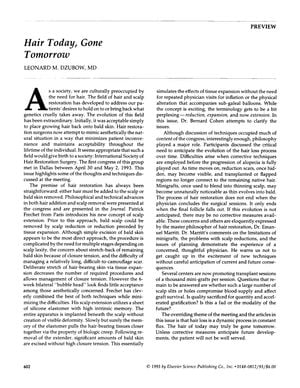Hair Today, Gone Tomorrow: Cultural Importance and Advancements in Hair Restoration
July 1993
in “
The Journal of Dermatologic Surgery and Oncology
”

TLDR The article concludes that hair restoration techniques must account for ongoing hair loss to ensure successful long-term results.
In the 1993 article "Hair Today, Gone Tomorrow," Leonard M. Dzubow, MD, discussed the cultural importance of hair and the advancements in hair and scalp restoration techniques. The article highlighted the first congress of the International Society of Hair Restoration Surgery, which took place in Dallas from April 30 to May 2, 1993. A new concept of scalp extension introduced by Patrick Frechet was presented, which involved using a silicone elastomer sheet implanted beneath the scalp to slowly stretch hair-bearing skin, simulating the effects of tissue expansion without the associated downsides. The article also emphasized the importance of considering the long-term progression of hair loss when planning restorative procedures, as techniques like minigrafts and scalp reductions may lead to issues if the hair loss process is not fully anticipated. Concerns were raised about the trend of transplanting a thousand mini-grafts per session and whether this could compromise blood supply and graft survival. The main message was that hair loss is a dynamic process, and future developments must be considered to ensure patient satisfaction.




